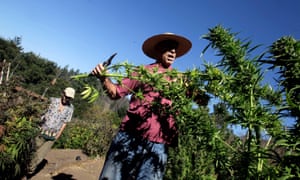Cannabis cultivators on farms over 2,000 square feet in the north
coast region will now have to register with local board to control
erosion and runoff issues

But, despite the 5-1 vote, the North Coast Regional Water Quality Control Board is unlikely to face a smooth roll-out of the new oversight and regulation.
“This is going to be good in the long run, but getting all of us growers, especially the small ones like me, is really going to be hard to do immediately,” Robert Anderson, a small pot farmer near Santa Rosa who barely makes the cutoff for the new regulations of a 2,000-square-foot farm, said on Thursday evening.
He was quick to insist however that the downsides of implementation should not outweigh the need to ensure the environment is protected. “We wouldn’t be good pot growers if we didn’t want to keep the land in good shape.”
The new rules will require pot growers with more than 2,000 square feet of land used for marijuana cultivation to register with the agency, or a third-party non-governmental agency or organization that has been approved by the regulatory body.
A number of issues including erosion control, water and wetlands buffers, irrigation runoff, chemical contamination and waste will be regulated under the new rules.
Each farm will then enroll in an annual program based on three regulatory tiers determined by the farm’s characteristics and the water resources it uses.
“Is it perfect? No, it’s not,” Eureka board member Geoffrey Hales was quoted by the Press Democrat as saying. “You’ve got to start somewhere.”
There are serious concerns, however, from board member Greg Giusti of Ukiah, who voted against the measure. He argued that growers were not being protected enough from federal law enforcement, and has urged greater privacy for farmers.
A major concern is that due to marijuana being illegal on the federal level, those farms prepared to comply and register could expose their activities to criminal charges on a federal level.
“I am not comfortable with people thinking they are doing the right thing, and then they get slapped, they get cited,” Giusti said.
Pot farmer Anderson agreed with Giusti’s concerns, but was hopeful Washington would not get involved. “It’s a good program, so let’s hope we don’t lose out on this because of federal stupidity.”
The north coast region runs along the Pacific ocean from San Francisco Bay to the Oregon border and includes high-density pot counties such as Humboldt.
Marijuana was decriminalized in California in 2011 and has been legal for medicinal purposes since 1996, but recreational use remains illegal.
No comments:
Post a Comment